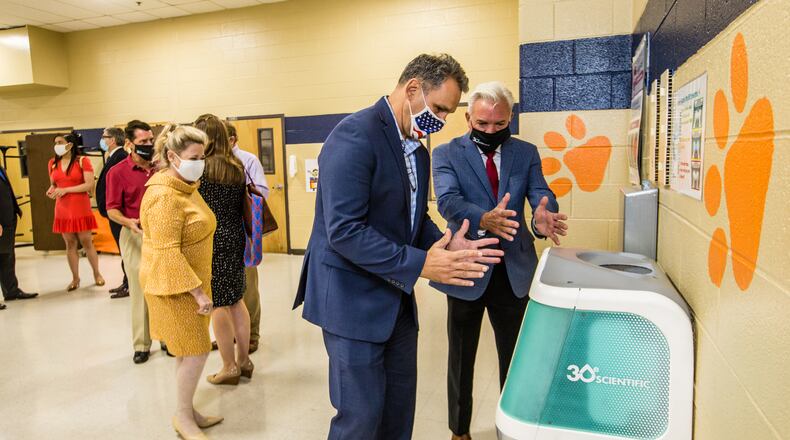The Cobb County School District’s controversial purchase of technology it said would fight the spread of COVID-19 in the classroom, school board governance and student inequities make up most of the complaints lodged to the accreditation agency Cognia.
Complaints submitted by three school board members, teachers and residents to the nonprofit organization, which accredits most public school districts in Georgia, led to the group launching a special review of the district. That review is set for August.
The Atlanta Journal-Constitution obtained a copy of a 12-page summary of the complaints submitted by several residents, including Cobb teachers and parents who also say the board is dysfunctional and fails to maintain fiscal oversight of the district.
Cobb schools spokeswoman Nan Kiel said the district has requested, but not received, any of the complaints cited by Cognia as part of its decision to conduct a special review.
“We have made direct requests, which have been dismissed,” the district spokeswoman said. “It is hard to prepare for a review based on complaints we have not seen.”
Most complaints, the earliest of which was submitted Jan. 14, are critical of the school board’s decision to spend up to $12 million in federal COVID relief funding to purchase UV sanitizing lights and hand-rinsing stations to install in elementary schools.
Valerie Testman, who has two children enrolled in the district, said she reached out to Cognia because the school board didn’t engage in enough discussion before purchasing equipment from companies that had no proven experience in fighting the coronavirus in schools.
Cobb school installed ProTek Life, Inc.’s UV sanitizing lights in several schools before removing them after a malfunction was reported in two offices at Argyle Elementary in Smyrna. The district, which paid ProTek Life more than $700,000 to install the lights. The district said it requested a refund.
Credit: Jenni Girtman
Credit: Jenni Girtman
30e Scientific’s Iggy hand-rinsing stations were initially installed at three elementary schools, and the district plans to roll them out to other schools. According to a presentation made to school board members, the product doesn’t kill the coronavirus that causes COVID-19, though it kills another common human coronavirus.
School board governance
Divisions on the Cobb County School Board began to appear in September 2019 when it voted along racial and political party lines to remove board member comments from meeting agendas.
It later split along those lines to reject the nomination of Charisse Davis, who is Black and the board’s only female member, to serve as board chair; disband a committee that would have explored renaming Wheeler High School; extend Superintendent Chris Ragsdale’s contract; and purchase the UV lights and hand-rinsing stations.
The board was also stymied last summer along those same lines when it could not agree on a resolution denouncing racism.
This chasm came to a head last November when the school board’s Republican members — David Banks, David Chastain, Randy Scamihorn and Brad Wheeler — approved a policy that requires board-requested agenda items get at least four members in support. Of the seven board members, the four Republicans are white, while the three Democrats are Black.
In January, the Democrats — Davis, Jaha Howard and Leroy “Tre” Hutchins — wrote a letter to Cognia saying their attempts to put items on board agendas were ignored. The topics included employee safety and morale during the COVID-19 pandemic, early literacy and governance training for board members.
Testman said the policy change on board-requested items was a “huge problem” because the Democrats have been silenced to the point that their voices no longer count.
“They are not taking into account that the district is progressively diverse, and they are not allowing the minority members of the board to even speak or advocate for their constituency,” Testman said of the Republican members.
Other complaints
Other complaints to Cognia said the school board and district fell short in its response to COVID-19, including public discussion. One teacher wrote she was worried about the safety of school educators and staff during the pandemic.
“I have spent my own money and time making my classroom as safe as possible,” the teacher said.
One parent expressed concerns about inequities in schools with predominately minority populations, and students being discriminated against by school staff and other students.
“I am very concerned about the direction of this school district and entrusting my children’s education to them over the next nine years if these issues are not addressed,” the parent wrote.
Along with the controversial technology purchase, Cobb parent and attorney Rob Madayag also wrote to Cognia with concerns that the district underreported school bullying incidents to the state.
Madayag was one of two attorneys who represented the parent of a Cobb student who said their son was criminally charged for fighting back against another pupil who was bullying him. The charges were later dropped and a civil lawsuit against two district employees was dismissed.
The attorney, who most recently represented parents who sued the district over its mask mandate, said he’s tried to resolve issues he’s raised with the school district, but has received no response.
“It was frustrating because more and more parents were reaching out to me about their kids being bullied,” he said.
Cognia has not publicly discussed the special review process. CEO Mark Elgart previously told the AJC that the review team will explore, among other things, whether the Cobb school board is being responsive to community concerns or if they are “shutting off constituent groups.”
“We don’t make a determination just based on somebody indicating they might be in violation of standard,” Elgart previously said. “We can only make that determination if we go in.”
Timeline of Cognia review of the Cobb schools
January: Three Cobb school board members complain to Cognia that they are being prevented from putting topics on meeting agendas
February: Cognia notifies Cobb schools about complaints
March: Cobb schools responds to Cognia’s complaints
April: Cobb schools announces Cognia will conduct a special review of the system’s governing practices
August: Cognia to conduct on-site review
About the Author
Keep Reading
The Latest
Featured




